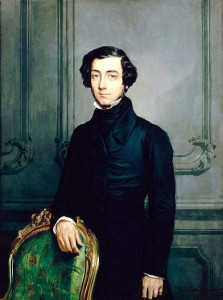American expansion was relentless after the American Revolution. From 1776 to 1850, settlers pushed into the Mississippi River Valley and then set their sights on Texas and beyond. As they moved outward, citizens in the original colonies felt a duty to ensure these settlers were not cut off from their spiritual roots.
Alexis de Tocqueville, the French historian, wrote from this viewpoint in Democracy in America about what he saw as the major contributing factor to the success of these settlers. He was convinced it was their Christianity that set them apart.
I have known of societies formed by the Americans to send out ministers of the Gospel to the new Western States to found schools and churches there, lest religion should be suffered to die away in those remote settlements, and the rising States be less fitted to enjoy free institutions than the people from which they emanated. I met with wealthy New Englanders who abandoned the country in which they were born to lay the foundations of Christianity and of freedom on the banks of the Missouri or in the prairies of Illinois.
One such effort de Tocqueville had in mind was the Mississippi Valley Enterprise, a Sunday school movement that followed the Western migration wherever it went. The MVE was the direct result of the American Sunday School Union, which was founded in 1817. A non-denominational organization, its members came from the Baptist, Episcopal, Methodist, Presbyterian, Moravian, Dutch Reformed, Congregational, Lutheran, German Reformed, and Friends churches. The objective of the ASSU was to establish Sunday schools, which were then left to “their own free choice” concerning denominational affiliation. Though managed by laymen, its missionary effort was carried on almost entirely by clergymen.
 The Union specifically formed the Mississippi Valley Enterprise to reach out to the ever-expanding country, and that it did. This effort established in excess of 60,000 Sunday schools that representing 2,650,000 students over a 50-year span. One remarkable missionary by the name of “Stuttering” Stephen Paxon started 1,314 Sunday schools with 83,000 students during his 20 year service.
The Union specifically formed the Mississippi Valley Enterprise to reach out to the ever-expanding country, and that it did. This effort established in excess of 60,000 Sunday schools that representing 2,650,000 students over a 50-year span. One remarkable missionary by the name of “Stuttering” Stephen Paxon started 1,314 Sunday schools with 83,000 students during his 20 year service.
This impetus to carry Biblical understanding to the territories wasn’t relegated to a single person or denomination. Methodist circuit riders were championed by Francis Asbury. In his lifetime he traveled 300,000 miles on horseback while facing hostile Native Americans, inclement weather, and illness. From 1771 to 1816, he preached 16,000 sermons and led American Methodists to grow from less than 300 members and four ministers to 200,000 led by 2,000 circuit preachers. Most of these Methodists had little education, lived simple lives, and championed unprecedented equality for both woman and African Americans.
While the Methodists were riding circuits, Baptists were spreading out as farmer/preachers. Like their Methodist counterparts, most were poorly educated, survived on meager funds, and were keenly in touch with the lives of the pioneer people they ministered to.
Ultimately, as these efforts moved westward with the settlers, Christian centers of education were founded as well. Methodists founded Northwestern University in Chicago, and the University of California was founded by Presbyterians before later becoming a state institution.
—–
Other observations from Alexis de Tocqueville:
Liberty cannot be established without morality, nor morality without faith.
The Americans combine the notions of religion and liberty so intimately in their minds, that it is impossible to make them conceive of one without the other.
©2011 Off the Grid News
 Off The Grid News Better Ideas For Off The Grid Living
Off The Grid News Better Ideas For Off The Grid Living
